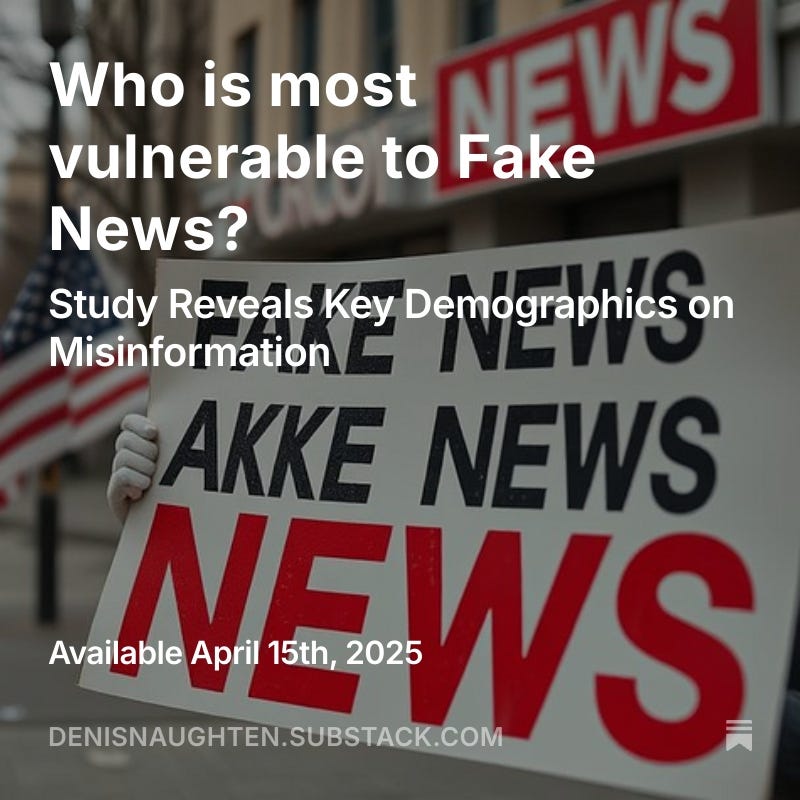Those who have grown up with technology are less likely to spot fake news.
A groundbreaking study[1] led by researchers from the University of Cambridge, in collaboration with leading global institutions, has highlighted that Generation Z, those born between 1997–2012, and who have grown up with technology at their fingertips, were most vulnerable to falling for misinformation. The study states that "Heightened exposure to digital environments, as is common for Gen Z, may not automatically result in higher digital literacy, likely due to the lower quality of news on social media."
For me, this phrase stands out for two reasons related to my time as Communications Minister in Ireland.
Firstly, during my term in office, I was frustrated by the lack of a coordinated approach to the issue of regulating online content across Government, so I established an open policy debate on online safety in March 2018. This culminated in the publication of an action plan for online safety[2] in July of that year in part to help protect Generation Z online and improve their digital literacy.
Although there was reluctance in certain quarters, the progress of this coordinated approach across Government Departments was remarkably swift compared to the vast majority of cross-departmental strategies and ultimately led to the creation of Coimisiún na Meán[3] as Ireland’s media regulator, tasked with enforcing the Online Safety Framework to protect people, especially children, from harm online.
Secondly, around the same time that I was spearheading this strategy, we had an insightful intervention from the most senior civil servant in Ireland, the then Secretary General to the Government, Mr Martin Fraser. In a report to the cabinet on the operation of the strategic communications unit, he said, “A thriving, independent Irish media – whether in the public or private sector - is essential to a healthy society. In the modern world of global media, online platforms and reduced audiences and readerships, it cannot and should not be taken for granted”[4].
This was significant not just in terms of the impact of misinformation on democracy, but as reflected in the Cambridge led study, the impact of “lower quality” news content on the ability to identify misinformation in the first place. At the time that this statement was issued, a debate was heating up in Ireland on funding for public service media, and the State broadcaster (RTÉ) in particular.
As Communications Minister, and as the line minister with responsibility for RTÉ, I had previously acknowledged the important role that public service media played in democratic society and the need to ensure it was adequately resourced to continue delivering its remit. This contributed to my broader policy initiative to expand quality balanced news reporting into the online sphere, a cornerstone of Irish traditional media. But if quality journalism was to be provided, support for national newspapers needed to be part of the debate[5][6] also. In this context, redefining public service ‘media’ and maintaining the core ethos of public service broadcasting in a multiplatform digital media landscape was a key challenge for me.
To that end, as Minister, I asked a Parliamentary Committee[7] to report on how the State could support “public service media” rather than just “public service broadcasters” and to consider commercial (local and national), community and print sectors in the process.
Although I started to implement the recommendations of the Parliamentary Committee report[8] and that of a second report following pre-legislative scrutiny of the Broadcasting (Amendment) Bill[9], progress on reform has been slow. After the change of Government in 2020, the new Government established the Future of Media Commission, which produced a report[10] for Government that was published 12 months after it was presented to the Minister. The implementation of these recommendations was being actively considered by Government prior to the General Election last November.
But as we can see from the University of Cambridge-led study, these delays are having a significant impact on the quality of news being consumed by young people today and as a result has the potential to be used for political manipulation, swaying voter opinions, thus raising concerns about the integrity of elections and the democratic process itself.
Therefore, politicians must, in the interests of democracy, actively address this issue of news quality which is undermining the ability of younger generations to identify fake news. In tandem with this, we must address the issue of digital illiteracy today particularly among Generation Z, with their inability to discern fake news despite high exposure to digital environments being a societal vulnerability.
You can access a further analysis of this study at: https://open.substack.com/pub/denisnaughten/p/who-is-most-vulnerable-to-fake-news?r=h1k7i&utm_campaign=post&utm_medium=web&showWelcomeOnShare=false
[1] Yara Kyrychenko, Hyunjin J. Koo, Rakoen Maertens, Jon Roozenbeek, Sander van der Linden, Friedrich M. Götz, (2025). Profiling misinformation susceptibility. Personality and Individual Differences, Volume 241, 2025. https://doi.org/10.1016/j.paid.2025.113177
[2] Government of Ireland (2018) Action Plan for Online Safety 2018 – 2019 www.gov.ie/pdf/?file=https://assets.gov.ie/27511/0b1dcff060c64be2867350deea28549a.pdf#page=null
[3] Coimisiún na Meán | Ireland's media regulator, https://www.cnam.ie/
[4] Martin Fraser (2018) Review of the Operation of the Strategic Communications Unit https://assets.gov.ie/2239/241018114432-1270b5c33f90419b933c6f5601dc2a2d.docx
[5] Denis Naughten in support of public funding for newspapers”, Sunday Independent, 16 October 2016. https://www.independent.ie/irish-news/denis-naughten-in-support-of-public-funding-for-newspapers/35133783.html
[6] Minister Denis Naughten on future funding of public sector broadcasting, Oct 13, 2016. https://aej.ie/minister-denis-naughten-on-future-funding-of-public-sector-broadcasting/
[7] Houses of the Oireachtas Joint Committee on Communications, Climate Action and Environment (2017). Report of the Joint Committee on the Future Funding of Public Service Broadcasting pp.69-71. https://data.oireachtas.ie/ie/oireachtas/committee/dail/32/joint_committee_on_communications_climate_action_and_environment/reports/2017/2017-11-28_report-on-the-future-funding-of-public-service-broadcasting_en.pdf
[8] Ibid.
[9] Pre-Legislative scrutiny of the General Scheme of a Broadcasting (Amendment) Bill 2017 https://data.oireachtas.ie/ie/oireachtas/committee/dail/32/joint_committee_on_communications_climate_action_and_environment/reports/2018/2018-03-08_report-pre-legislative-scrutiny-of-the-general-scheme-of-a-broadcasting-amendment-bill-2017-and-retransmission-fees_en.pdf
[10] Report of the Future of Media Commission https://assets.gov.ie/static/documents/report-of-the-future-of-media-commission.pdf





